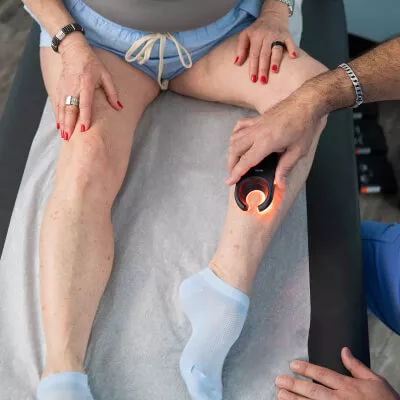Did you know that people with diabetes are at a higher risk for developing vein disease? This is because chronically high blood sugar can damage the walls of vessels.
Learn more about the link between diabetes and vein disease, common vein issues in diabetics, and what you can do to minimize your risks.
How Diabetes Affects Your Vein Health
Type 2 diabetes is a highly preventable metabolic disease that causes high blood glucose and affects over 38.4 million Americans. While most of these cases have been diagnosed, more than 8.7 million remain undiagnosed.
Due to the consistently high blood glucose levels associated with diabetes, this chronic condition can impact multiple organs, including the heart, eyes, and kidneys. However, many people do not realize that diabetes also affects the vessels.
This is because diabetes can cause the vessels to undergo abnormal changes that result in irreversible damage due to plaque buildup, inflammation, increased pressure, and thickened blood. Unfortunately, much of this damage is asymptomatic at the start, so without early detection, it often progresses.
Nerve damage may make it harder to detect progressing conditions due to numbness from diabetic nerve damage.

Common Vein Problems in Diabetics
Individuals with untreated diabetes, or diabetes that has been unmanaged for a prolonged period, face various issues with their leg vessels. These problems result from poor circulation and inflammation. Problems that can present due to poor circulation and inflammation include:
-
Chronic Venous Insufficiency (CVI): High blood sugar causes insufficient blood flow due to vein narrowing and thickened blood. This leads to vein valve and wall damage, resulting in blood pooling and insufficient flow to the heart.
-
Varicose Veins: Diabetes causes widespread inflammation, which affects how vein valves function and weakens vein walls. Blood pools, darkening and stretching the vein.
-
Deep Vein Thrombosis (DVT): Plaque buildup in deep veins is common among diabetics. Unfortunately, this increases the risk of developing a blood clot due to obstructed blood flow.
Peripheral Artery Disease: A Complication of Diabetes
According to the American Heart Association, diabetics are at significant risk of developing atherosclerosis, due to their propensity to obesity, high blood pressure, inflammation, and high cholesterol, among other risks. Peripheral artery disease (PAD) happens when arteries narrow or become blocked completely due to atherosclerosis (hardening of the arteries due to plaque buildup).
Symptoms of PAD include:
- Foot or leg cramping and numbness
- The feeling of coldness in one leg
- Leg or foot ulcers that won't heal
- Weak pulse in the legs or feet
- Hair loss on the affected leg
It's important to note that some people feel no symptoms at all, so it's best to get a screening for PAD if you have diabetes. Early detection is the best way to avoid complications.
The Impact of Diabetic Neuropathy on Vein Health
Long-standing diabetes can lead to nerve damage, known as diabetic neuropathy. This condition can lead to pain and numbness in the legs..
Treatment options include:
- Insulin or antidiabetic medications
- Medications used to treat neuropathy
- TENS therapy
- Foot care
Microvascular Complications of Diabetes
Microvascular damage, which involves injury to small blood vessels, is a common complication of poorly managed diabetes. This damage results in an increase in reactive oxygen species, harming cells and promoting inflammation. Additionally, the condition activates abnormal levels of protein kinase C (PKC), leading to further tissue damage.
High blood sugar can disrupt various processes in the body, primarily affecting the eyes and kidneys, leading to complications such as retinopathy and nephropathy.
Managing Vein Health with Diabetes
If you have been diagnosed with diabetes, it's important to protect your vascular health by managing your blood sugar levels. Regular exercise, a low-carb diet, and quitting smoking can all be beneficial. If you're at risk of developing vein issues, your doctor may recommend wearing compression socks to improve circulation in your legs. This can help reduce the risk of developing blood clots or venous ulcers.

What Are the Treatment Options for Vein Disease?
Treatment options for vein disease include lifestyle changes like regular exercise and minimally invasive procedures. If diabetes is present, prescription medication may also be included such as Metformin to manage blood sugar.
Medications:
- Metformin (Glucophage): Reduces how much blood sugar you absorb from dietary sources.
Lifestyle Modifications:
- Exercise: Losing excess weight can reduce pressure on your veins and improve blood sugar levels.
- Hydration: Staying hydrated will help thin the blood, leading to improved circulation.
- Low-Carb Diet: A low-carb diet regulates your blood sugar by deterring spikes in glucose.
Minimally-invasive procedures:
- Sclerotherapy: A vein specialist injects sclerosant into a damaged vein to scar it and close it off.
- Endovenous laser treatment: The specialist may also use a special laser to close off a varicose vein.
How to Prevent Vein Problems in Diabetics
The best way to catch vein problems early is through regular screenings. During a screening, a vascular specialist will physically examine your legs and feet for signs of vein damage or disease. However, it's best to self-examine between visits to catch abnormalities early on.
Look for the following during your self-exam:
- Pain or tenderness when palpating your leg
- The appearance of an ulcer
- Abnormal skin changes
- Temperature differences between each leg
- Visible blue or black veins
- Bulging veins
If you have any concerns about diabetes and your vein health, schedule a free vein health evaluation with Metro Vein Centers.
Frequently Asked Questions
How does insulin resistance affect vein health in diabetics?
Insulin resistance impairs vascular functioning, leading to increased inflammation and damage to vessels..
Can managing diabetes reverse the early stages of vein disease?
No, managing diabetes cannot reverse vein disease, but may help improve associated symptoms.
What are the best exercises for diabetics to improve vein health?
Cycling, yoga, walking, and leg lifts are all great exercises to improve circulation in the legs.
How often should diabetics have vascular screenings?
People with diabetes should have a vascular screening every three to five years.

Dr. Philip LoPresti
Meet Dr. Philip LoPresti DO, DABVLM, FACS, a board-certified vein specialist and surgeon with over 20 years of experience. Schedule an appointment with him in Queens, NY today.
Meet Dr. Philip LoPresti
Trusted insight from the nationally accredited, board-certified vein doctors at Metro Vein Centers.







